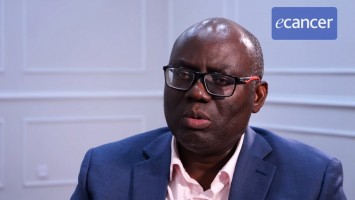Yesterday I had a presentation which was essentially about focussing on how to improve the quality of cancer screening. My talk was focussing on the low- and middle-income countries. The cancer screening programmes are there in all the countries but then the quality and reach of the programme is highly variable and especially in the low- and middle-income countries there are a lot of issues in terms of quality and reach of cancer screening programmes. So, for example, there are countries which have cancer screening coverage which is less than 5% but then, more importantly, we don’t even know what is the coverage of cancer screening in many countries. Then also we have to understand that coverage does not tell us much about the quality of cancer screening programme. So we need to collect data to estimate the other indicators which are beyond cancer screening coverage, going into detection of the disease and, more importantly, how many of those who have been detected to have cancer or pre-cancer have been treated? So that is the importance of collecting data using certain indicators and measuring the impact of the cancer screening, especially in the low-and middle-income countries there is a high deficiency of these kinds of activities.
Why are initiatives in monitoring of cancer screening in low- and middle-income countries important?
Cancer screening is a great public health programme but if it is not implemented with appropriate quality there can be harms. Harms can be at the individual level, so, for example, men and women may get a lot of false positive results and they may have psychological or physical harms because of that. More importantly, there can be drainage of the programmatic resources if the screening programme is not implemented with the appropriate quality. So that is why quality is important and to understand quality we have to measure the activities.
For measurement of activities, as you can well understand, we have to collect the data across the cancer screening programme continuum, right from the number of women or men participating to what happens to them after participating. So that is why cancer screening data collection is important.
What are some of the initiatives that have been taken so far and what are their results?
Every country, when they launch a cancer screening programme, they are supposed to have a built-in quality assurance programme which should collect data on a regular basis and then assess the performance of the programme. Unfortunately, in many countries, especially in the low- and middle-income countries, this culture is not there. Mostly it is on paper but then the implementation is very poor.
So that is why at IARC we have initiated a new project which we call Cancer Screening in Five Continents, or CanScreen5 in short. This aims to collect data on cancer screening programme performance from different countries across the globe. But then this project is not about passive data collection – we want to improve the capacity of the countries to understand the importance of having quality assurance in the programme, the importance of collecting data on a regular basis to measure performance of the programme and use that data to improve the quality of the programmes. So that is why CanScreen5 invests quite a lot in training of the cancer screening programme managers and then work with them to collect the information and data from the different cancer screening programmes.
We are going to publish the results of our data that have been collected from 85 different countries across the world. In spite of all the challenges, we managed to collect information and data and that result will show what is the big deficiency, big gap, that is there in cancer screening programme data collection from the low- and middle-income countries.
Even in many of the high-income countries the programmes do not collect data across the continuum of cancer care. So there is deficiency in data collection all over the world but then this is much more in the low and middle income countries, showing the poor quality and then poor focus on the quality of cancer screening programmes in the LMICs.
What are the future plans regarding this?
The CanScreen5 project is a global project and it’s not time-bound, as you can understand. It is going to be a continued project. Depending on the resources, we will continue to do training of the programme managers.
Then for its long-term sustainance, what we are doing is we are training the master trainers in the different countries. So, for example, a couple of months back we trained master trainers from 17 African countries. These are cancer screening programme managers but then they will also act as master trainers to train more programme managers. So that way this will have a ripple effect and then they will gradually train more and more people to understand the value of quality in cancer screening. As they get trained we will also keep collecting data. But then certainly it is a global project we do need resources and support from different funding agencies, other interested stakeholders. Thankfully we have received support from many of the organisations that are interested in improving cancer care for men and women in the world.








